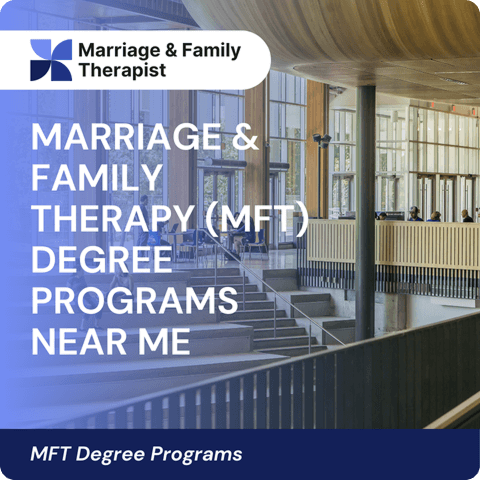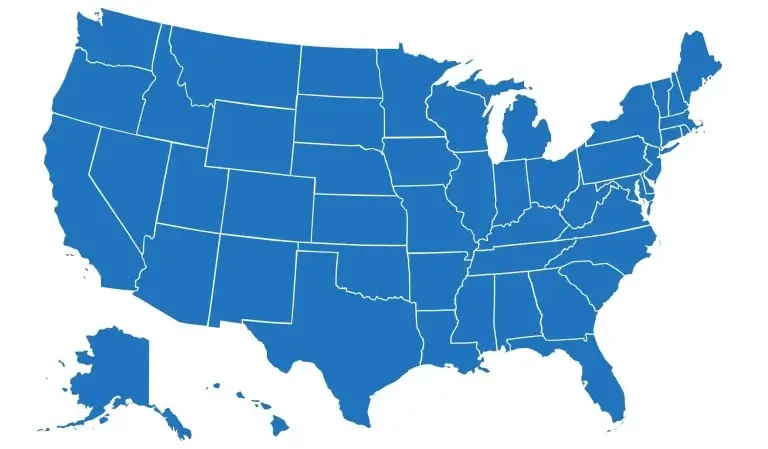Marriage & Family Therapy (MFT) Degree Programs Near Me
Choosing the right Marriage and Family Therapy (MFT) program is a critical step toward becoming a licensed therapist. With MFT programs available across the United States, finding an accredited program that fits your needs is now easier than ever. This guide provides an overview of accredited MFT degree programs by state, helping you explore schools near you that offer top-notch education, clinical training, and licensure preparation. Whether you’re looking for a master’s in MFT, post-master’s certificate in MFT, or doctorate in MFT, our state-by-state guide ensures you can find accredited programs that align with your career goals, budget, and location preferences.

Find MFT Programs by State

- AL Alabama
- AK Alaska
- AZ Arizona
- AR Arkansas
- CA California
- CO Colorado
- CT Connecticut
- DE Delaware
- FL Florida
- GA Georgia
- HI Hawaii
- ID Idaho
- IL Illinois
- IN Indiana
- IA Iowa
- KS Kansas
- KY Kentucky
- LA Louisiana
- ME Maine
- MD Maryland
- MA Massachusetts
- MI Michigan
- MN Minnesota
- MS Mississippi
- MO Missouri
- MT Montana
- NE Nebraska
- NV Nevada
- NH New Hampshire
- NJ New Jersey
- NM New Mexico
- NY New York
- NC North Carolina
- ND North Dakota
- OH Ohio
- OK Oklahoma
- OR Oregon
- PA Pennsylvania
- RI Rhode Island
- SC South Carolina
- SD South Dakota
- TN Tennessee
- TX Texas
- UT Utah
- VT Vermont
- VA Virginia
- WA Washington
- WV West Virginia
- WI Wisconsin
- WY Wyoming
Each state offers unique MFT degree programs, with specific licensure requirements and accredited institutions. Our comprehensive state guides help you find programs in your area, covering key details such as:
- Accreditation Status: Programs accredited by the Commission on Accreditation for Marriage and Family Therapy Education (COAMFTE) or other recognized bodies.
- Degree Levels Offered: Master’s, post-master’s certificates, and doctorate degrees in MFT.
- Program Formats: On-campus, online, and hybrid options for flexibility.
Clinical Training Requirements: State-specific clinical hour mandates for licensure. - Tuition and Financial Aid Options: In-state tuition benefits, scholarships, and funding opportunities.
Each state page provides a detailed list of accredited schools, program offerings, tuition costs, and licensure guidelines, making it easier to compare options and choose the best fit for your educational journey.
What Schools Offer MFT Degree Programs?
Marriage and Family Therapy (MFT) degree programs are offered at a variety of institutions, including universities, private colleges, community colleges, and online institutions, giving students multiple pathways to earning their degree. These programs provide specialized training in family systems, couples counseling, and mental health treatment, equipping graduates with the skills needed to become licensed therapists.
Program Formats: Online, Hybrid, and In-Person
MFT programs are available in three main formats:
- In-Person Programs – Traditional on-campus programs offer face-to-face learning, direct faculty mentorship, and hands-on clinical training in university-affiliated counseling centers. These programs are ideal for students who thrive in a structured academic environment.
- Hybrid Programs – A blend of online coursework and in-person clinical training, hybrid programs allow students to complete the academic portion remotely while fulfilling supervised practicum requirements in local settings.
- Fully Online Programs – Designed for students who need flexibility, online MFT programs deliver coursework in a virtual classroom while requiring students to complete clinical hours at approved sites in their area. These programs are particularly beneficial for working professionals or those with family commitments.
- Regardless of the format, accredited MFT programs ensure that students receive rigorous academic training and supervised clinical experience, which are essential for state licensure and professional competency.
Types of Institutions Offering MFT Programs
MFT degrees can be pursued at various types of institutions, each offering different advantages based on learning preferences, budget, and career goals:
- Public Universities & State Colleges – These institutions provide affordable tuition and access to well-established clinical training programs. Many public universities offer both master’s and doctoral degrees in MFT with strong research and practicum components.
- Private Colleges & Universities – Known for smaller class sizes and specialized faculty expertise, private institutions often provide intensive, hands-on training and may offer unique therapeutic approaches or faith-based counseling tracks.
- Community Colleges – Some community colleges offer associate degrees or certificate programs in counseling-related fields, which can serve as a stepping stone to a master’s-level MFT program.
- Online Institutions – Many accredited online universities provide MFT degrees at the master’s, post-master’s certificate, and doctoral levels, allowing students to complete coursework from anywhere while fulfilling clinical hour requirements locally.
Choosing the Right MFT Program
When selecting an MFT program, students should consider several key factors, including:
- Accreditation – Ensure the program is accredited by the Commission on Accreditation for Marriage and Family Therapy Education (COAMFTE) or another recognized accrediting body to meet state licensure requirements.
- Program Format – Decide whether an on-campus, hybrid, or online program fits your schedule and learning preferences.
- Clinical Training Opportunities – Look for programs that offer strong practicum and internship placements, as hands-on training is a critical component of MFT licensure.
- Faculty & Specializations – Some programs offer specialized coursework in areas like trauma therapy, addiction counseling, or LGBTQ+ family dynamics, which can help align your education with your career goals.
- Cost & Financial Aid – Tuition varies widely between public, private, and online programs, so exploring financial aid, scholarships, and assistantship opportunities can help reduce costs.
With a wide range of program options and learning formats, students pursuing a Marriage and Family Therapy degree can find an educational path that suits their personal and professional needs, ensuring they receive the comprehensive training necessary for a successful career in the field.